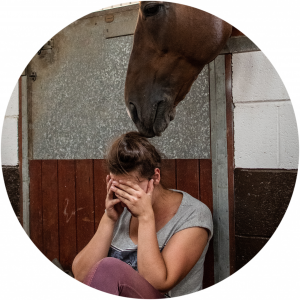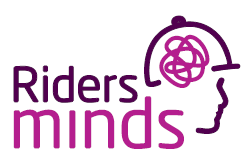
Head First: POST CONCUSSION MENTAL HEALTH CHECKER
Concussion is a brain injury. It’s a serious matter. It’s far more than ‘just a bang on the head’.
Recovery can take time, longer than many expect or realise. It’s known as the ‘invisible injury’ for very good reasons.
Identifying any signs of change to your way of being, ‘your normal’, is essential to your recovery, including brain function and mental health.
A mental health study, conducted by Charles Owen revealed that 6 in 10 riders suffer from depression after a concussion.
In response to this we have launched our Head First campaign which aims to get equestrians to re-think concussion.
Use this following tool to regularly check signs of deterioration and/or poor mental health, or the mental health checker.
In the event of changes, and/or you’re worried, please, have a conversation or call Riders Minds 24/7 helpline; contact your GP or medical professional.

HEAD FIRST CHECKER:
FOUR KEY AREAS
These could be new, or pre-existing conditions, worsened or altered by concussion.
COGNITIVE FUNCTION

Q: Compared with before your concussion, are you experiencing:
- cognitive impairment i.e. memory loss, difficulties remembering, retaining new information, forgetfulness, confusion?
- struggles to pay attention, focus, concentrate, think clearly, make decisions?
- becoming easily distracted?
- slow/sluggish thinking known as ‘brain fog’?
- recurrent flashbacks, nightmares?
- changes to your ability to ride, drive, jump, event, show, vault etc?
- changes in performing equestrian tasks, eg from tacking up, rugging to remembering courses, tests?
- or continued difficulty returning to your pre-concussion equestrian ability?
MOOD/BEHAVIOUR

Q: Compared with before your concussion, are you experiencing:
- significant character, personality, temperament, behaviour changes?
- mood swings: unexpected, out of place, or trigger-less?
- new or different ‘bad’ habits, repetitive behaviours?
- loss of enthusiasm; apathy and/or ambivalence towards life, loved ones, job, your horses, riding, competing etc that wasn’t there before the concussion?
- having negative/self-harm/suicidal thoughts?
- behaviour changes in your pony/horse(s)? these can indicate/reflect changes going on for you.
Q: Compared with before your concussion, are you feeling significantly more:
- irritable, short-tempered, grumpy, or easily angered?
- depressed, sad, lonely, alone, tearful, emotional, isolated, helpless, hopeless?
- frustrated, impatient, upset, agitated, restless, lethargic?
- stressed, anxious?
- that conversations are difficult, less manageable eg with owners, trainers, other riders?
PHYSICAL

Q: Compared with before your concussion, are you experiencing significantly more:
- tiredness, exhaustion and/or fatigue?
- effort required to carry out normal, necessary or pleasurable, daily activities, obligations, commitments? including your equestrian ones?
Q: Are you experiencing any physical changes?
EXAMPLE; hand to eye and /or limb coordination, sight, vision, headaches, speech, breathing, heartbeat, muscle tics or spasms? Unable or struggle to do things you used to? Fumbling tacking up, mucking out.
Given the co-dependency between physical and mental health, changes in our physical health and function can affect our mental health and vice-versa.
SLEEP

Q: Compared with before your concussion, are you experiencing significantly more:
- Trouble falling/staying asleep.
- Sleep disturbance, deprivation, insomnia.
- Need for daytime sleep, falling asleep during the day.
If you have had a concussion and are experiencing any of the signs detailed above please have a conversation, contact your GP or medical professional or call the Riders Minds 24/7 helpline.
For fellow equestrians, friends and family, owners, trainers and coaches.
- Raise your awareness when you know someone has had concussion.
- Be observant and notice if they’re not their ‘OK/normal self’ afterwards, or if you see that they’re struggling, particularly in the three key areas of cognitive function, mood/behaviour, and physical as outlined above.
- Alternatively someone may share with you they are struggling, or simply in passing conversation.
- In the event of either of the above, our tips for having a courageous conversation are here to help.
Riders Minds are here to support you.
If you need help call:
To access the live chat simply click the chat button at the bottom of your screen and you will be connected to one of our team.


